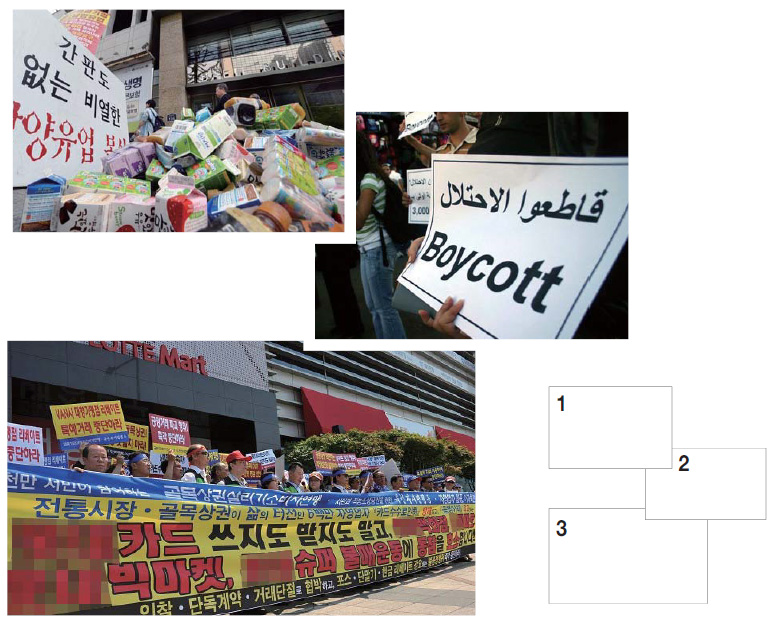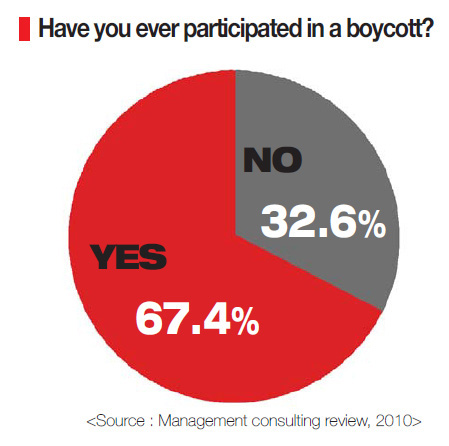In India, Gandhi started a boycott of products made in the UK for independence. This boycott was close to impossible, but it was successful by the active participation of citizens. In Korea, people boycotted products made by 'Namyang Dairy Products' this year. Consumers felt indignation that the Namyang salesperson spoke verbal abuses against the small distributor and forced him to handle an excessive amount of sales, so they urged a boycott. Let us get to know about boycotts, which express one's opinion by buying nothing.-Ed.

1.Products of a company are piled in front of the firm's headquarters.
2.The Palestinian boycott campaigns against the products of the Israeli occupation
3.The Consumers’ Association to Save Small Businesses started their boycott for an indefinite period against Lotte Group products and its big-box stores.
■ What is a boycott?
A boycott is an act of voluntarily abstaining from using, buying, or dealing with a person, organization, or country as an expression of protest, usually for social or political reasons. Sometimes, it can be a form of consumer activism. In capitalist societies, there are two ways for citizens themselves to fight against giant capital enterprises in order to protect their rights. One way is to control production by workers who participate in production. Another way is to control sales of products by consumers. A strike is a typical example of the former. In the case of the latter, it’s a boycott.
The word ‘boycott’ is derived from the name of Captain Charles Boycott, a land agent who attempted to evict eleven tenants from his land, but eventually was deposed by the tenants’ united action of isolating him economically. Today, boycotts are generally legal in developed countries, including Korea, in consideration of the fact that individual consumers are always free to make whatever purchasing decisions they want, for whatever reasons they wish; that is the essence of a free society and a free market.
Where we can find examples of boycotts?
These days, boycotts are increasingly becoming a common movement in Korea. Now, let’s see some examples of boycotts. Firstly, the Consumers’ Association to Save Small Businesses started their boycott against Lotte Group products and its big-box stores from last year. They have demanded that large marts take mandatory days off on Sundays and that credit card commission rates be reorganized. According to the organizations in the letter sent to Lotte Group, “We hope this boycott will be an opportunity to understand that for us self-employed workers, it has to do with the right to live.” Also, Oh Ho-seok, head of the Consumers’ Association, said, “The planned boycott by independent store owners is aimed at putting into place the proper legislature to protect small businesses from getting bullied by bigger firms.” Their persistent efforts helped enact the laws limiting large market’s business hours such as mandatory days off on Sundays.
Also, in July, a chauffeur workers union started a boycott against the tyrannies of the driver’s employers. To be specific, the owners of the driving service enterprises gained unjust enrichment and exploited driver’s labor through raising the commission on driver’s sales by 20~30%. Moreover, if call-center employees working for a driving service company do not take a call in five seconds, the owners bring down their wages by 500 won for each call. Lee Mi-kyong, the worker of the Korean Confederation of Trade Unions, said, “The boycott which started in Gyeong-nam has been ongoing since a month ago and Dae-jeon finished their movement, achieving several positive outcomes.”
■ What do people think about boycotts?
Choi Hye-ri (Dept. of Psychology) said about a boycott, “I think it seems to be marginal that a boycott affects a company financially. For example, according to major supermarkets, it reported that there was a decrease of about 15% of Namyang sales, but, conversely, about 85% of their sales remained. Although the short-term impact by a boycott may not be fatal to a company, a negative image of the corporation would continue to affect customers.”
From another viewpoint, Lee Ha-na (Dept. of Consumer Studies) said, “A corporation can achieve positive renovation of its image. For instance, people boycotted Nike in the United States because it ignored the situation that exploited child laborers at a subcontract factory in China and Vietnam. When the boycott worsened, Nike didn't renew its contract with the existing subcontract factories and promised that they would assume moral responsibilities. In addition, they strengthened their policy which manages the subcontract factories. This boycott helped Nike break down negative practices and restore their tarnished image. Eventually, a boycott is not just a crisis but also an opportunity for a company.”
According to Prof. Kim Song-ki (Dept. of Economics), “Companies and consumers have different purposes in pursuit of benefits. Companies want maximized profits, and consumers want to buy goods with appropriate prices. However, companies sometimes make goods which consumers don’t want. As a result, consumers boycott to express their ideas against company policies. However, boycotts rarely succeed because it is hard to organize consumers, and they are so impulsive. For example, some consumers post negative incidents which make them angry, but the anger softens as time passes.”
In addition, he said, “It’s important to prevent boycotts by the public because it’s too difficult to successfully protest with an unpredictable public. In order to prevent boycotts, consumers and companies have to build their trust. It’s a bad thing when the control is centered on one side between consumers and companies. Instead, they have to affect each other by forming trust between them interdependently. It is important to settle their conflicts harmoniously because they have different aims.”

By Lee Su-ji l sj34@cbnu.ac.kr
By Kang Hye-min l hm34@cbnu.ac.kr


 All
All Feature
Feature






 Lee Su-ji & Kang Hye-min
Lee Su-ji & Kang Hye-min











